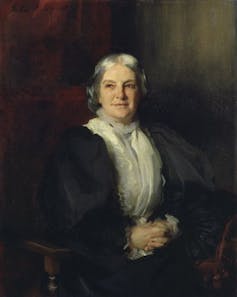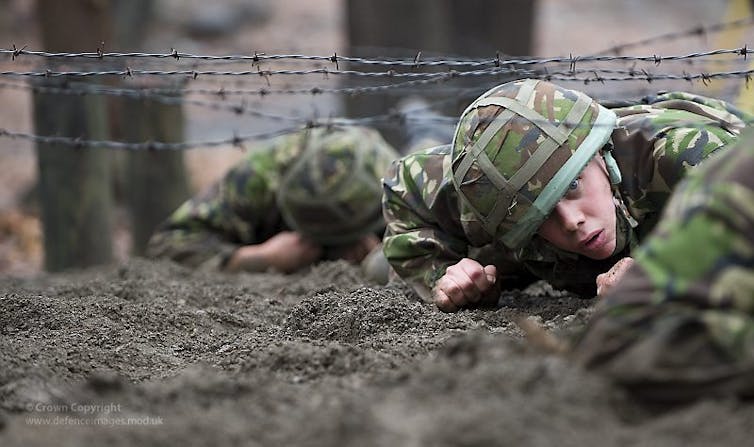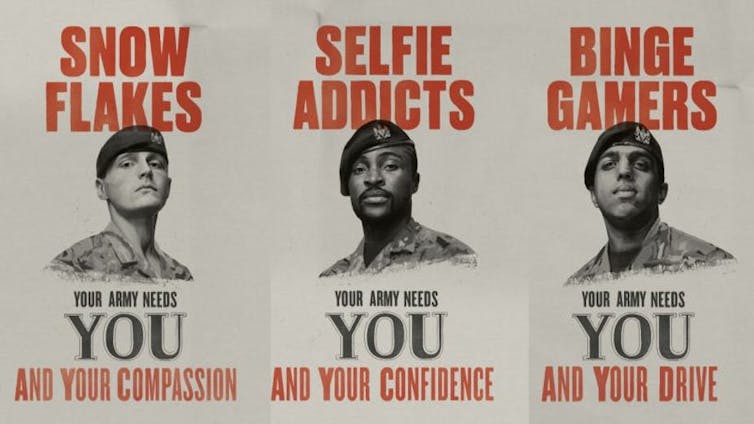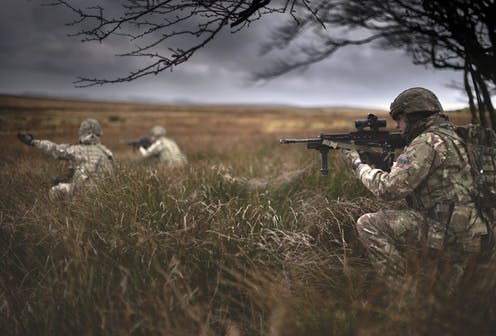In the UK, 16 and 17-year-olds can join the British Army as soldiers, with consent from their parents. Soldiers cannot be deployed to the front line until they are aged 18. Here, Matt Fossey and Nick Caddick from the Veterans and Families Institute at Anglia Ruskin University debate whether this should continue.
Matt Fossey:
It seems as though every day I read the news, only to find yet another horrific story of a young person being stabbed. Recently, one victim lost her life in a park in East London only a couple of miles from where I live. As the father of four children this is of huge concern – even though, according to Professor Stephen Pinker, we live in the safest period in human history.
Rapper and political activist Akala recently made an impassioned plea to disassociate knife crime from race and ethnicity, and rather consider it as a maliferous by-product of gang culture, which is a growing menace in the UK. He went on to make the point – supported by academic research – that gang culture and associated violent crime is not just a contemporary phenomenon, but has its origins in history. The root causes of the problems are increases in poverty, domestic violence, school exclusion and disenfranchised youth.
What does this have to do with 16-year-olds enlisting in the army? I recently spent a fascinating morning talking to army welfare staff about their young recruits and some of the social challenges they face. The overwhelming feeling was that the army offers young people a viable and accessible alternative at a time when some could have quite easily drifted down another path – the path of gangs and gang violence.
Colleagues discussed how the army provided these young people, from very poor socioeconomic backgrounds, with an opportunity to find meaning in their lives, develop comradeship and interpersonal skills as well as train for a variety of trades – opportunities which may have been difficult to obtain through conventional school or college education. What’s more, the army is the largest provider of apprenticeships in the UK.
There is some evidence to suggest that quasi-military interventions are an option to divert young people from gangs – but there is currently no UK research that considers this issue in any detail. Research findings from the USA are ambiguous: the military is seen as a diversion from gangs, but at the same time a breeding ground for gang involvement and weapons training.

Portrait of Octavia Hill by John Singer Sargent. Wikimedia Commons.
Yet history shows that the military ethos, structure and discipline has long been used as a tool for social reform. In 1889 the social reformer and co-founder of the National Trust, Octavia Hill, established the Southwark Cadet Company with the aim of offering the youth of south London a gateway out of poverty. She strongly believed that joining the cadets could help disenfranchised young people find direction.
It could be argued that this rationalisation is anachronistic and based on the social conditions of Victorian Britain. But I believe that the contemporary issues of social exclusion and alienation are not wholly dissimilar to those found in the slums of London 130 years ago.
Nowadays, the combined cadet force (CCF) – which is the integrated school-based counterpart to military cadet units – seem to be mainly the preserve of middle-class children at grammar and private schools. If these cadet units could be better integrated into comprehensive education (as is the government’s intention) then 16-year-olds from less fortunate backgrounds, who seek a sense of belonging and adrenalin-fuelled experience, could have the opportunity to explore the options presented by the military and in turn may wish to continue their studies within the British Army.
I am not suggesting that the military is a panacea for all social evils. But 16-year-olds should be given a range of credible options, which have the potential to enhance their lives and help them to contribute to society. Joining the army is one such option.
Nick Caddick:
The UK’s policy of permitting 16-year-olds to join the military needs an urgent rethink. Criticism of this policy has stepped up in recent weeks, following the publication of a critical report by Forces Watch and Medact on military recruitment practices. The report calls for the minimum age of recruitment to be raised to 18, and for greater scrutiny of the military’s marketing to under-18s. The case to raise the minimum age is compelling, and built on medical evidence, sound logic and ethical standards.
Medically, adolescence is considered a “window of vulnerability”, during which the brain, and the ability to make well-reasoned decisions, are still developing. This means that teenagers recruited to the army are more likely to be acting on impulse than making a fully informed decision about their future. They are also less likely to withstand the physical and emotional strains of military life and training.

Tough training. Defence Images/Flickr.
Research also suggests that young people who have experienced childhood adversity are more likely to develop mental health problems in the army. One study, for example, found that up to 76% of military personnel have suffered two or more instances of childhood adversity, and that factors such as younger age, lower educational attainment and serving in the army were all linked with higher vulnerability to depression and anxiety.
In one sense, the age limit on recruitment is arbitrary: 16-year-olds will, of course, vary in their physical and emotional maturity. So a better way to judge “readiness” for military life might be competency, rather than age. But this would require a test to rule out vulnerable recruits, which has already been tried and proven ineffective. So age seems to be the best possible criteria – and, on balance, 18-year-olds will be better prepared to undertake the life-changing process of becoming a soldier than 16-year-olds.
There are also serious logical flaws in the policy of allowing 16-year-olds to join the army. It’s inconsistent with many other legal age limits, which are set at 18 or older. Supposedly, 16-year-olds are not mature enough to vote, but they can still make life-changing decisions about their future. They cannot purchase knives, yet they can learn to use lethal weapons. Perhaps the greatest irony is that the sale of certain military video games is prohibited to under-18s.
There are also ethical objections to the way the military markets itself to young people. The Forces Watch and Medact report argued that recruitment campaigns unreasonably portray military life as superior to civilian life, and that they gloss over the realities of an armed forces career.

Recent army advertisements caused a stir.
These objections are bolstered by figures from the military itself, which suggest that only half of recruits felt they had an accurate picture of service life before joining, while only 38% of non-commissioned personnel in the Army and Royal Navy would recommend joining the service to others.
Of course, there will be examples of people who joined young and whose lives were transformed for the better. People will point to these individuals as evidence that the recruitment age should be kept at 16. But we have to consider the evidence of risk from the population as a whole, not just those who do well. By continuing recruitment at 16, the government shows deeply flawed reasoning while ignoring both medical evidence and ethical critique. It’s time to ditch this archaic practice.
Matt Fossey:
I think Nick hits the nail on the head with his argument that the “age limit for recruitment is arbitrary”. You can drive a tractor for agricultural purposes at 13 and fire a shotgun (under supervision) at 15. Although you currently have to be over 18 to vote in general elections, some polls – for example the Scottish independence referendum in 2014 and Welsh Assembly elections from 2021 – allow 16-year-olds to vote.
If 16-year-olds want to join the military, they must have consent from their parent or guardian. There is already an acknowledgement that the young person needs the legal ratification of an adult. Besides, they are not contractually tied into the British Army at this stage.
There are break points and many young people realise that the military is not for them and are able to discharge themselves, as an analysis of early service leavers shows.
All advertising paints a picture which is rosier than reality. The stark realities of jobs for teachers, nurses or social workers are not splattered across advertising hoardings either. I suggest that many young people have made their minds up about joining the military a lot earlier than their 16th birthday.
Nick Caddick:
Take Matt’s argument to its logical conclusion: if more young people joined the military, there would be less gang violence. But there’s a fundamental flaw in this argument. How do we know that the young people caught up in knife crime would have joined the military, given the chance? When currently they can indeed join – and evidently choose not to.
Matt and I are agreed about the root causes of youth violence, but disagree on the solution. The military is most assuredly not the answer to knife crime – and to suggest that it might save young people from gang involvement distorts Akala’s important critique and bends it toward an answer he didn’t suggest.
There is zero reliable evidence that the option of military service at 16 prevents vulnerable youth from turning to violence. The problem of youth violence requires real investment in communities and a commitment to tackling poverty – not a paternalistic suggestion that they should go and join the military. We cannot allow the military to be presented as the saviour of young people, when it could just as easily lead to their downfall.



 Locked up then locked out: how NZ’s bank rules make life for ex-prisoners even harder
Locked up then locked out: how NZ’s bank rules make life for ex-prisoners even harder  BTC Flat at $89,300 Despite $1.02B ETF Exodus — Buy the Dip Toward $107K?
BTC Flat at $89,300 Despite $1.02B ETF Exodus — Buy the Dip Toward $107K?  FxWirePro- Major Crypto levels and bias summary
FxWirePro- Major Crypto levels and bias summary  Britain has almost 1 million young people not in work or education – here’s what evidence shows can change that
Britain has almost 1 million young people not in work or education – here’s what evidence shows can change that  Glastonbury is as popular than ever, but complaints about the lineup reveal its generational challenge
Glastonbury is as popular than ever, but complaints about the lineup reveal its generational challenge  Debate over H-1B visas shines spotlight on US tech worker shortages
Debate over H-1B visas shines spotlight on US tech worker shortages  AI is driving down the price of knowledge – universities have to rethink what they offer
AI is driving down the price of knowledge – universities have to rethink what they offer  What’s the difference between baking powder and baking soda? It’s subtle, but significant
What’s the difference between baking powder and baking soda? It’s subtle, but significant 

































